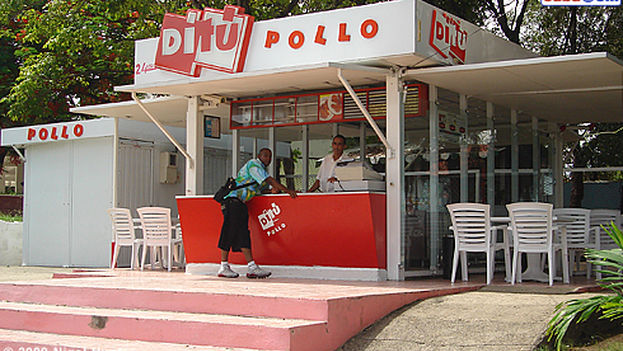
![]() 14ymedio, Zunilda Mata, Havana, 30 January 2018 — Despite a national inspection almost two years ago, the popular state food chain Di tú continues to illegally sell “homemade” croquettes of poor quality, according to a note published in the newspaper Granma on Tuesday.
14ymedio, Zunilda Mata, Havana, 30 January 2018 — Despite a national inspection almost two years ago, the popular state food chain Di tú continues to illegally sell “homemade” croquettes of poor quality, according to a note published in the newspaper Granma on Tuesday.
The Communist Party’s newspaper reports that following complaints from consumers the Food Production Company (Prodal), the chain’s only supplier, did a study in mid-2016 and “it was found that 75% of the food sold came from other sources.”
These croquettes, sold at 10 cents CUC and usually made with chicken, are very popular on the Island, a situation that for administrators and employees of these state-owned stores is seen as an opportunity to obtain benefits.
“It is a sound business because the croquette is what sells best in these places, and taking advantage of that margin they sell them to other people who sell them privately, and everyone shares the profits,” Berta Gonzalez, resident of the municipality Diez de October, told Granma.
As a result of this manipulation, consumers claim that Di tú’s croquettes are now smaller and the dough’s taste and appearance is not the same as before, which leads them to suspect that they have been victims of a substitution.
The official press confirms the customers’ complaints and note that these products do not meet the sanitary requirements nor have the same size or flavor as the chain’s original croquettes. In the preparation of the croquettes a series of strict parameters must be followed that detail the ingredients and preparation of this product sold in state food stalls.
Despite the technical inspections carried out by the authorities, the official media have not said whether the industrial croquettes, destined for state establishments, are also sold in illegal outlets.
To correct the situation and meet the demand the Food Industry Business Group has made investments in recent months aimed at “increasing production capacities,” Iris Quiñones, president of Prodal, told the official press.
The state entity processes about 15,000 tons of meat, poultry, fish and shellfish a year for distribution to the hotel network and the domestic market in CUC. Its production is mainly focused on picadillo, croquettes, meatballs, steak and hamburger, which also end up on the dining tables of workplaces, schools and hospitals.
Granma not only laments the “illegal act of introducing merchandise” in the state circuit and thus obtaining “a profit that does not appear in any accounting book,” but also questions where the individuals get the infrastructure to make a “homemade croquette so similar to the one really produced industrially.”
Popular inventiveness has managed to manufacture machines that mimic the finish of a state-produced croquette. Recently, the digital site El Toque told the story of a resident of Placetas, in Villa Clara, who put together one of those devices from bicycle parts, a culinary meat grinder and a piece of a plastic soda bottle.
Previously, small domestic industries dedicated to the falsification of beers and soft drinks have also been detected. However, it is the first time that officialdom has acknowledged that the cooked food offered in its network of stores also suffers from adulteration.

_____________________
The 14ymedio team is committed to serious journalism that reflects the reality of deep Cuba. Thank you for joining us on this long road. We invite you to continue supporting us, but this time by becoming a member of 14ymedio. Together we can continue to transform journalism in Cuba.
